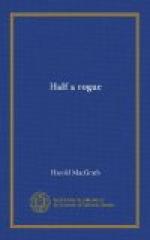The present mayor was a shrewd Democrat who understood the diplomacy of petty politics. He shook the grimy hand of toil in preference to the gloved hand of idleness. He was thoroughly a politician. He never disregarded public opinion openly. He never sailed close to the wind, but spent his time in safe tacks to whatever harbor he desired. He was McQuade’s man just so long as McQuade made the business worth while. He had opened up many new streets, abolished needless nuisances, and these concessions gave him a strong hold on the independent voter. He was a king over frogs which had changed much since Aesop’s time, for now they let well enough alone.
Nevertheless, things were going from bad to worse. Three terms are likely to cause a man to grow careless or indifferent, and Donnelly was making frequent bad breaks. The senator, ever watchful, believed he saw a chance to sweep McQuade off the board.
McQuade had an able lieutenant in Alderman Martin, whom the sporting fraternity followed loyally. Martin owned and ran the most disreputable hotel in the city. It occupied a position of unusual prominence on one of the principal business streets. There was a saloon and a cheap restaurant on the ground floor. On the second floor were wine-rooms and a notorious gambling-den. Above this was the hotel. The guests stole in at midnight and stole out at dawn.
This gambling-den was frequently the bone of contention between energetic ministers of the gospel and the police department. Regularly the police swore that gambling did not exist in town, and regularly the ministers went on a still hunt for proofs. Singularly enough, they never found any. A hint from headquarters, and the den would close up till after the excitement was over. All the newspapers understood that the police lied; but the editors were either afraid or indifferent; and the farce was played over yearly for the benefit of the ministerial association.
The place was run honestly enough. When the stakes are small, the professional gambler does not have to be dishonest. All the same, this kind of gambler is the most despicable of men. He lures the wage of the poor; clerks, bookkeepers, traveling salesmen, laborers, college boys, men who drink too much of a Saturday night, all these come to the net. Nobody ever wins anything; and if perchance one does make a small winning, it goes quickly over the bar. Women wait and wonder at home; it is their common lot. The spirit of the gambler is in us all, and we might as well confess it here and now. It is in the corpuscles: something for nothing, something for nothing!
Martin was a power in the Common Council. He could block or put through any measure. He always carried a roll of gold-bills in his pockets—for what purpose no one had the temerity to inquire. His following was large and turbulent; it came from the shops and the factories and the streets. In his ward no candidate had ever defeated him. “Nice people” had very little to do with Mr. Martin; the laborer who was honest had little to do with him, either. He was a pariah, but a very formidable one. Yet, no one, though many accused him, caught him in a dishonest deal.




